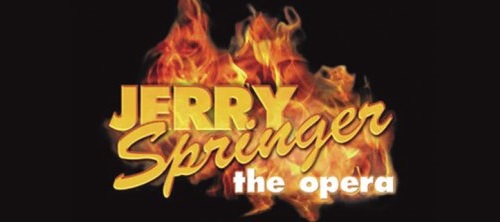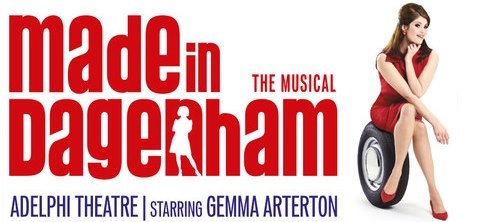Pas de biographie disponible.
Compositeur Musique additionelle Librettiste Parolier Metteur en scène Chorégraphe Producteur création Producteur version

Musical
Musique: Richard Thomas • Stewart Lee • Paroles: Richard Thomas • Stewart Lee • Livret: Production originale: 2 versions mentionnées
Dispo: Résumé Synopsis Génèse Liste chansons
Genèse: Battersea Arts Centre and the Edinburgh Festival Richard Thomas's one act opera, Tourette's Diva, was performed at London's Battersea Arts Centre in May 2000 and featured two members of a dysfunctional family singing obscenities to each other. This led Thomas to create his one-man show How to Write an Opera About Jerry Springer, which was performed at the Centre in February 2001. In May 2001, Thomas returned to the Battersea Arts Centre with his show How to Write an Opera About Jerry Springer, accompanied by four singers in a tiny studio theatre. It attracted positive press and investment. Stewart Lee teamed up with Thomas, and the two began to write Jerry Springer: The Opera. The show received its first performance, while still under development, at the Centre in August 2001, with a cast of twelve. It ran for a week, selling out. When the show returned to the Centre in February 2002, the three-week run sold out in advance. The show was then performed in concert at the Edinburgh Festival in August 2002, selling out. Jerry Springer came to see the show and endorsed it, stating, "I wish I'd thought of it myself." The Edinburgh run included the introduction of character of Tremont – an amalgamation of two previous characters. Australian-born actor, Andrew Bevis, created the new role. Following the Festival run, Nicholas Hytner offered to include the show in his opening season as director of the National Theatre in London. National Theatre and Cambridge Theatre The first fully staged production of the musical was performed at the National Theatre on 29 April 2003, with a cast of 33, including Bevis as Tremont and Michael Brandon as Jerry. It played to packed audiences and received favourable reviews. The show had its final performance at the National Theatre on 30 September 2003, before moving to the West End. Jerry Springer – The Opera at the Cambridge Theatre in London On 10 November 2003, the show opened at the Cambridge Theatre, with the same cast as the National Theatre production, and ran there until 19 February 2005, before starting a tour of the United Kingdom. The West End run was sponsored by British Sky Broadcasting. On 12 July 2004, David Soul took over the role of Jerry from Michael Brandon. In 2004, a Broadway production was announced, and then cancelled. 2006 UK Tour In September 2005, seven months after the show closed in London's West End, it was announced that the show would tour 21 regional theatres around the United Kingdom. Nine theatres that were originally scheduled to host the show pulled out after Christian Voice threatened to picket them. In addition, Arts Council England turned down a bid for funding, stating that the decision was based on the show's commercial pedigree rather than "pressure from extremist groups". The tour ran for 22 weeks, starting at the Theatre Royal in Plymouth on 27 January 2006. Immediately prior to the show's opening in Plymouth, it was reported that members of the far-right British National Party were part in a local campaign against the performances, although Christian Voice claimed to disapprove of their involvement. According to Ticketmaster UK, ticket sales were good throughout the tour, and reviews were positive. The cast for the tour included several cast members from the London cast, and American actor, Rolf Saxon, replaced David Soul as Jerry Springer. The tour had a scaled-down set and scaled-down effects as well as a smaller on-stage "audience".
Résumé: 'Come and see America's favourite TV host suffer the worst day of his career.' Jerry Springer the Opera, is a new opera based on America's most lurid talk show and the US host who brought worldwide television audiences programmes entitled 'Pregnant by a Transsexual', 'Here Come the Hookers'and 'I Refuse to Wear Clothes.'
Création: 29/4/2003 - National Theatre - Lyttelton Theatre (Londres) - représ.

Musical
Musique: David Arnold • Paroles: Richard Thomas • Livret: Richard Bean • Production originale: 1 version mentionnée
Dispo: Résumé Génèse Isnpiration Liste chansons
Inspired by a true story and based on the hit movie, Made in Dagenham is the uplifting new West End musical comedy about friendship, love and the importance of fighting for what is right.
Genèse: The musical is based on the 2010 film Made in Dagenham, which in turn centred around the true-life events of the Ford sewing machinists strike of 1968. The film principally follows the main character of Rita O'Grady, who acts as the spokesperson for a group of female workers at Ford's Dagenham plant, who go on strike to fight the inequality that becomes apparent when women workers were to be paid less as they were classed as unskilled. In contrast, their male colleagues were classed as skilled and ultimately received more pay. These actions led to the creation of the Equal Pay Act 1970. It received four British Academy of Film and Television Arts nominations,[8] including Outstanding British film. In December 2011, it was first revealed that a musical adaption of the film Made in Dagenham was being worked on. A reading of the book from the show took place the same month with two workshops also being held the following year. During these workshops, actress Gemma Arterton played the lead role of Rita and in August 2013, Producers Stage Entertainment revealed that they would like Arterton to play the role subject to scheduling and were seeking an autumn 2014 opening. On 3 March 2014, the show was officially confirmed and it was announced that the show would premiere in London in autumn 2014. The musical has a book by Richard Bean and is directed by Rupert Goold, with choreography by Aletta Collins, set and costume design by Bunny Christie and lighting by Jon Clark. The musical's score is composed by David Arnold, with lyrics by Richard Thomas and sound design by Richard Brooker. Describing the production, producers revealed that whilst based on the film, it won't be a direct copy of it, saying "Some of the characters from the film will be dropped, and new ones introduced. Not all the elements from the film will be on stage, and we'll expand on things the film barely touched on".
Résumé: Essex 1968. Like millions of other working women, each morning Rita O’Grady is just trying to get her husband out of bed, get the kids off to school and get to work at the factory on time. But life is about to change forever when it’s announced that the girls in the sewing room of Ford’s Dagenham car plant will have their pay grade dropped to ‘unskilled’. Quickly drawing on a strength she never knew she had, Rita leads her friends in a battle against the might of Ford and the corruption of the Union supposed to protect them. As the girls’ inspiring journey gets bigger than anyone could have imagined, the pressure is too much for some, but can Rita keep up the fight and the happy home she’s worked so hard for?
Création: 5/11/2014 - Adelphi Theatre (Londres) - représ.